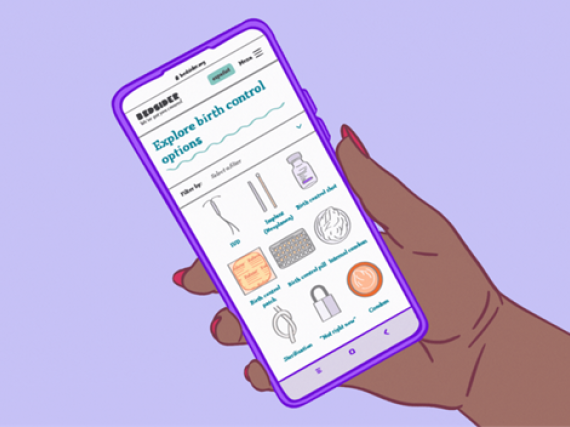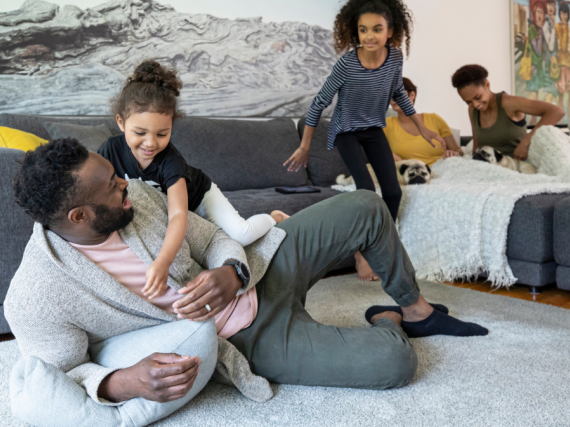Why I Talk About…
As we grow from children to young adults to less young adults, the types of conversations that we have around sex, love, and relationships grow with us. This year, during October and Let’s Talk Month we’re focusing on that evolution and centering our conversations around the words, “Let’s talk about…”
I’m a gynecologist, so I spend my time in the clinic talking to a variety of people about their bodies, sex lives, and the rest of their life too. But there are two things I find myself discussing most often with my patients. First, we talk about people’s plans and intentions are around family planning and—depending on the type of sex they’re having—if they need birth control. For anyone I see having penis in vagina sex I want to make sure that they’ve thought about and planned for birth control and protection if they don’t want to get pregnant any time soon. Personally, the way I approach that is to root our conversation in their overall life. What are their plans for their life? What do they see themselves doing? When, if ever, do they want to have children and what might that look like for them? These conversations help to ensure that whatever comes next isn’t just, ‘Do you want to start a birth control pill?’ It’s about relating their answers back to their goals and what their life actually looks like.
Second, we talk about the nature of someone’s relationships. I want to make sure that my patients are in a healthy relationship, that they feel empowered in that relationship, and that whoever they’re with and whatever types of sex that they’re having is comfortable and satisfying for them. I open conversations about pleasure because people often are really uncomfortable talking and asking questions about pleasure. People frequently have questions or are feeling that something’s wrong with them if they’re not experiencing sex in the same way as others. I believe that it’s important to open that conversation up and normalize it. I want to let folks know that if sex is going fine for them and they have no concerns that’s great. But if it’s not, at least I’ve opened the door so that people can feel comfortable telling me, ‘I’ve never had an orgasm. I don’t know if there’s something wrong with me,’ or ‘I can only have an orgasm with masturbation. I’ve never had an orgasm with a partner.’ People sometimes don’t know that you can have that conversation with your provider and that your provider should be trained to have that conversation with you and help navigate your concerns.
Unfortunately, because our nation doesn’t have basic sex ed, a lot of people—especially young people— don’t understand their basic anatomy; they haven’t learned about the vulva and the clitoris or how the penis works. Once the door is open, many people have questions. For example, with those with a vulva and vagina I often field concerns about discharge. People really don’t know if having discharge is normal (it is!).
Again, it’s important to normalize these subjects. I hope that parents and champions have age-appropriate conversations with their young people starting young and continuing throughout their life based on is relevant and appropriate at each stage of development. For example, when kids are young, I encourage parents and champions to teach the anatomic names for body parts, which is important to ensure that no one is being inappropriately touched or to learn if children are having issues with their bodies in some way.
Then as young people age the conversation can morph to include discussions of healthy relationships, consent, and appropriate use of technology. There are so many conversations to be having with our young people so that they feel prepared and empowered. Doing so will give them a resource to go to when they have questions, which are inevitable. Young people’s bodies go through so many changes—and their emotions and their hormones change too. Open a conversation and tell them, ‘Hey, I know you’re going through a lot, and I want you to know that I’m a trusted resource. I might not have all the answers, but I want you to know that you can come to me for help and questions or if you’re experiencing anything and you’re not sure if it’s normal or not. We can figure it out together.’
The things I discuss with patients in the exam room are incredibly important. But they don’t all need to stay there; much of what we talk goes beyond the patient-provider interaction and parents and champions should bring these conversations home with them to keep them going. It may be hard at first, but your young person will recognize and appreciate the effort you put in. And sometimes just knowing that there’s a trusted adult with an open ear ready for them is enough. So, go find your young person today and say, “Let’s talk about…”



